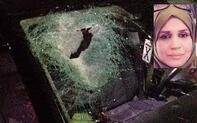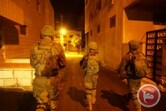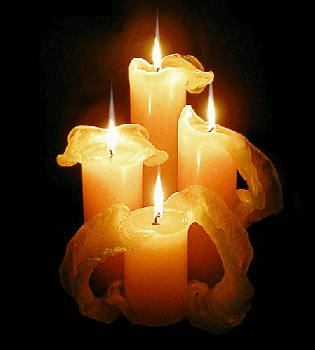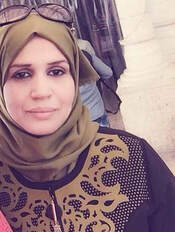1 feb 2019

On the night of 12 October 2018, Aisha al-Rabi, a Palestinian in her 40s, was riding in her family’s car, seated next to her husband and with her two daughters asleep in the back.
These would be the final minutes of her life. The mother-of-seven was killed moments later, after being struck in the head by a stone thrown by a group of teenage Jewish settlers on a road near the settlement of Rehelim in the occupied West Bank.
Rabi’s brutal murder was just one of 482 attacks carried out by Jewish settlers against Palestinians in the occupied West Bank during 2018, a threefold increase over the previous year.
Even more worrying, Israel’s security agency, Shin Bet, forecasts a continued upward surge in settler violence against Palestinians this year, warning that extremist Jewish groups are “committed” to terrorizing Palestinians in the occupied territory.
Clear and sinister motive
It’s hard to imagine how 2018 could have been any worse for the more than six million Palestinians who live in Israel and the occupied territories. Not only did the US sanctify an Israeli war crime in relocating its embassy from Tel Aviv to Jerusalem, but it also cut funding for the United Nations Relief and Works Agency for Palestine Refugees, jeopardizing the lives of hundreds of thousands Palestinian refugees who depend on the agency for their daily survival.
Also last year, Israeli snipers assassinated around 200 peaceful Palestinian protesters in Gaza, including women, children, medics and journalists, all killed since the Great March of Return began on 30 March.
Added to this misery is the fact that illegal Jewish settlers are now seemingly hell-bent on going after the more than two million Palestinians who legally occupy the West Bank.
While only a small number of the 482 settler attacks in 2018 were fatal, the objective of this violence has a clear and sinister motive: to terrorize the indigenous population into fleeing their homes for refugee camps in Jordan, Lebanon, Syria, Gaza and elsewhere.
Acts of settler violence have included physical assaults and the vandalism and destruction of Palestinian-owned farmland, homes and vehicles. In addition, “price tag” attacks have been designed to “exact a price” from local Palestinians for residing on the land that Israeli settlers deem desirable for themselves.
Apartheid system of governance
Palestinian residents in the village of Yasuf described to Middle East Eye how they awoke to find their car tires slashed, and their homes and local mosque covered in racist graffiti, including: “Death to Arabs”, “Price tag” and “Revenge”.
These attacks are occurring and increasing for one very simple reason: The perpetrators are neither deterred, arrested nor punished. In the occupied West Bank, there is one set of laws and rules for Palestinians, and another for Israeli settlers. This is the hallmark of an apartheid system of governance: two laws for one land.
In fact, the entire Israeli judicial system is based on racism and prejudice against non-Jewish people, so much so that it refuses to recognize the rights of Palestinians who live lawfully on their land, while at the same time granting extraordinary legal rights to Jewish settlers who live in settlements that defy international law.
It’s also easy to argue that in the Trump era, which has effectively given Israel a green light to do whatever it pleases against Palestinians - no matter how repressive, illegal or immoral - there is a climate of impunity for settlers in the West Bank. This is illustrated by the fact that the Israeli government issued its highest number of new settlement construction tenders in more than a decade during the past year.
‘Green light’ for settlements
When I spoke with former Palestinian health minister Basem Naim, he identified four factors behind the surge in settler violence, including the Israeli government’s tacit support of right-wing extremism; the refusal of the Israeli judicial system to hold violent settlers accountable; the US government’s “green light” for building more settlements; and the “collaboration” of Palestinian Authority security forces with Israel.
Omar Baddar, a Palestinian American and deputy director of the Arab American Institute, told me: “Donald Trump’s administration is the most viciously anti-Palestinian administration in the history of the US.
"[As a result], Israeli settlers have picked up on the climate created by their own extremist government and the unconditional backing of the Trump administration, which in turn emboldens them to carry out further aggression against the Palestinians, knowing accountability is a very distant prospect.”
With these political winds favoring Israel’s settler movement - one that’s enthusiastically led by the Netanyahu government and underwritten by the Trump administration - 2019 promises to be every bit as violent towards Palestinians living under the boot of an ever-expanding settler population, one that’s becoming increasingly emboldened and radicalized.
- CJ Werleman is an opinion writer for Salon, Alternet. His article appeared in the Middle East Eye.
These would be the final minutes of her life. The mother-of-seven was killed moments later, after being struck in the head by a stone thrown by a group of teenage Jewish settlers on a road near the settlement of Rehelim in the occupied West Bank.
Rabi’s brutal murder was just one of 482 attacks carried out by Jewish settlers against Palestinians in the occupied West Bank during 2018, a threefold increase over the previous year.
Even more worrying, Israel’s security agency, Shin Bet, forecasts a continued upward surge in settler violence against Palestinians this year, warning that extremist Jewish groups are “committed” to terrorizing Palestinians in the occupied territory.
Clear and sinister motive
It’s hard to imagine how 2018 could have been any worse for the more than six million Palestinians who live in Israel and the occupied territories. Not only did the US sanctify an Israeli war crime in relocating its embassy from Tel Aviv to Jerusalem, but it also cut funding for the United Nations Relief and Works Agency for Palestine Refugees, jeopardizing the lives of hundreds of thousands Palestinian refugees who depend on the agency for their daily survival.
Also last year, Israeli snipers assassinated around 200 peaceful Palestinian protesters in Gaza, including women, children, medics and journalists, all killed since the Great March of Return began on 30 March.
Added to this misery is the fact that illegal Jewish settlers are now seemingly hell-bent on going after the more than two million Palestinians who legally occupy the West Bank.
While only a small number of the 482 settler attacks in 2018 were fatal, the objective of this violence has a clear and sinister motive: to terrorize the indigenous population into fleeing their homes for refugee camps in Jordan, Lebanon, Syria, Gaza and elsewhere.
Acts of settler violence have included physical assaults and the vandalism and destruction of Palestinian-owned farmland, homes and vehicles. In addition, “price tag” attacks have been designed to “exact a price” from local Palestinians for residing on the land that Israeli settlers deem desirable for themselves.
Apartheid system of governance
Palestinian residents in the village of Yasuf described to Middle East Eye how they awoke to find their car tires slashed, and their homes and local mosque covered in racist graffiti, including: “Death to Arabs”, “Price tag” and “Revenge”.
These attacks are occurring and increasing for one very simple reason: The perpetrators are neither deterred, arrested nor punished. In the occupied West Bank, there is one set of laws and rules for Palestinians, and another for Israeli settlers. This is the hallmark of an apartheid system of governance: two laws for one land.
In fact, the entire Israeli judicial system is based on racism and prejudice against non-Jewish people, so much so that it refuses to recognize the rights of Palestinians who live lawfully on their land, while at the same time granting extraordinary legal rights to Jewish settlers who live in settlements that defy international law.
It’s also easy to argue that in the Trump era, which has effectively given Israel a green light to do whatever it pleases against Palestinians - no matter how repressive, illegal or immoral - there is a climate of impunity for settlers in the West Bank. This is illustrated by the fact that the Israeli government issued its highest number of new settlement construction tenders in more than a decade during the past year.
‘Green light’ for settlements
When I spoke with former Palestinian health minister Basem Naim, he identified four factors behind the surge in settler violence, including the Israeli government’s tacit support of right-wing extremism; the refusal of the Israeli judicial system to hold violent settlers accountable; the US government’s “green light” for building more settlements; and the “collaboration” of Palestinian Authority security forces with Israel.
Omar Baddar, a Palestinian American and deputy director of the Arab American Institute, told me: “Donald Trump’s administration is the most viciously anti-Palestinian administration in the history of the US.
"[As a result], Israeli settlers have picked up on the climate created by their own extremist government and the unconditional backing of the Trump administration, which in turn emboldens them to carry out further aggression against the Palestinians, knowing accountability is a very distant prospect.”
With these political winds favoring Israel’s settler movement - one that’s enthusiastically led by the Netanyahu government and underwritten by the Trump administration - 2019 promises to be every bit as violent towards Palestinians living under the boot of an ever-expanding settler population, one that’s becoming increasingly emboldened and radicalized.
- CJ Werleman is an opinion writer for Salon, Alternet. His article appeared in the Middle East Eye.
24 jan 2019

Israeli authorities on Wednesday released new information about the death of Aisha al-Rabi, who was killed by a mob of right-wing Israelis in October 2018, stating that they had found DNA of the central suspect in the case on the rock that caused her death.
Of the five right-wing Israeli teens arrested for the crime last month, just one remains in custody – the other four were released without charges. This is despite the multiple eyewitnesses that saw a group of Israelis hurling rocks at al-Rabi and her husband.
Al-Rabi was a mother of eight children who was driving with her husband near their hometown of Bidya, near Salfit in the northern part of the West Bank.
They were attacked by a mob of right-wing Israeli youth who threw numerous rocks at the couple, breaking the windshield and killing al-Rabi.
The new evidence, according to Israeli authorities, was uncovered through detailed laboratory analysis of the rock that struck al-Rabi in the head, killing her.
The Israeli settler charged with the killing is expected to be indicted on Thursday.
Israeli authorities arrested five Israeli settlers on December 30th. Initially the authorities did not disclose that the five had been arrested, due to a gag order forbidding the public disclosure of information or comment on a particular matter.
Shin Bet added that the five were students at the Pri Haaretz religious seminary in the Rechelim settlement, in the northern occupied West Bank district of Nablus, were arrested “after intelligence efforts connecting them to the death of al-Rabi.”
“The four were released after it was decided that the investigation could continue while they were under house arrest and other limiting conditions,” the Shin Bet noted.
The Israeli settlers who carried out the attack are among the 600,000 Israeliswho live in Jewish-only settlements across occupied East Jerusalem and the West Bank in violation of international law.
Palestinian towns and villages in the Nablus area are surrounded by Israeli settlements and outposts, many of which are protected by the Israeli military and have gained notoriety for being comprised of the most extremist settlers.
However, the Palestinian government has no jurisdiction over Israelis in the West Bank, and violent acts carried out by Israeli settlers often occur in the presence of Israeli military forces who rarely act to protect Palestinian residents.
Of the five right-wing Israeli teens arrested for the crime last month, just one remains in custody – the other four were released without charges. This is despite the multiple eyewitnesses that saw a group of Israelis hurling rocks at al-Rabi and her husband.
Al-Rabi was a mother of eight children who was driving with her husband near their hometown of Bidya, near Salfit in the northern part of the West Bank.
They were attacked by a mob of right-wing Israeli youth who threw numerous rocks at the couple, breaking the windshield and killing al-Rabi.
The new evidence, according to Israeli authorities, was uncovered through detailed laboratory analysis of the rock that struck al-Rabi in the head, killing her.
The Israeli settler charged with the killing is expected to be indicted on Thursday.
Israeli authorities arrested five Israeli settlers on December 30th. Initially the authorities did not disclose that the five had been arrested, due to a gag order forbidding the public disclosure of information or comment on a particular matter.
Shin Bet added that the five were students at the Pri Haaretz religious seminary in the Rechelim settlement, in the northern occupied West Bank district of Nablus, were arrested “after intelligence efforts connecting them to the death of al-Rabi.”
“The four were released after it was decided that the investigation could continue while they were under house arrest and other limiting conditions,” the Shin Bet noted.
The Israeli settlers who carried out the attack are among the 600,000 Israeliswho live in Jewish-only settlements across occupied East Jerusalem and the West Bank in violation of international law.
Palestinian towns and villages in the Nablus area are surrounded by Israeli settlements and outposts, many of which are protected by the Israeli military and have gained notoriety for being comprised of the most extremist settlers.
However, the Palestinian government has no jurisdiction over Israelis in the West Bank, and violent acts carried out by Israeli settlers often occur in the presence of Israeli military forces who rarely act to protect Palestinian residents.
15 jan 2019

Rishon LeZion Magistrate's Court extends remand of teen suspect in death of Aisha al-Rawbi, killed after settlers allegedly hurled stones at her vehicle.
The minor detained on suspicion of involvement in the death of Palestinian woman Aisha al-Rawbi is expected to be indicted with manslaughter, the State Prosecutor's Office said on Tuesday.
Al-Rawbi was killed after settlers reportedly hurled stones at a vehicle in which she and her husband were driving in the West Bank in October. Meanwhile, the Magistrate's Court in Rishon LeZion extended by six days the remand of the teen who was arrested two weeks ago.
His remand was extended at the request of the police and the Shin Bet domestic security service.
"As the probe into the death of Aisha al-Rawbi concluded, the investigation materials were transferred to the District Prosecutor's Office that has been working on this case from day one.”
An indictment was filed Tuesday at the Magistrate's Court in Rishon LeZion against the minor for grave security offenses.
The youth was taken into custody on December 30, 2018, and his remand was extended three times since. The Honenu organization, which provides legal aid to Jewish terror suspects, claimed that the police had refused to transfer investigation materials to the minor's attorneys.
"By failing to forward the documents that are supposed to be reviewed by the defendant's defense team, the police have crossed every red line," the organization said.
The minor remained silent during questioning, however, the police and the Shin Bet say they have evidence tying him to the crime scene. A gag order has been placed on details of the investigation.
In response, the minor's father claimed the Shin Bet was setting his son up. "We have the strong feeling our son is being persecuted. During the time of the incident, my son, along with dozes of his friends, attended a Shabbat mea. However, the system is systematically ignoring his solid alibi."
Initially, the police arrested five teens on suspicion of committing grave terror offenses, including murder.
On Friday, four out of the five Israeli teenagers were released to a six-day house arrest, during which the suspects are not allowed to speak with each other.
The minor detained on suspicion of involvement in the death of Palestinian woman Aisha al-Rawbi is expected to be indicted with manslaughter, the State Prosecutor's Office said on Tuesday.
Al-Rawbi was killed after settlers reportedly hurled stones at a vehicle in which she and her husband were driving in the West Bank in October. Meanwhile, the Magistrate's Court in Rishon LeZion extended by six days the remand of the teen who was arrested two weeks ago.
His remand was extended at the request of the police and the Shin Bet domestic security service.
"As the probe into the death of Aisha al-Rawbi concluded, the investigation materials were transferred to the District Prosecutor's Office that has been working on this case from day one.”
An indictment was filed Tuesday at the Magistrate's Court in Rishon LeZion against the minor for grave security offenses.
The youth was taken into custody on December 30, 2018, and his remand was extended three times since. The Honenu organization, which provides legal aid to Jewish terror suspects, claimed that the police had refused to transfer investigation materials to the minor's attorneys.
"By failing to forward the documents that are supposed to be reviewed by the defendant's defense team, the police have crossed every red line," the organization said.
The minor remained silent during questioning, however, the police and the Shin Bet say they have evidence tying him to the crime scene. A gag order has been placed on details of the investigation.
In response, the minor's father claimed the Shin Bet was setting his son up. "We have the strong feeling our son is being persecuted. During the time of the incident, my son, along with dozes of his friends, attended a Shabbat mea. However, the system is systematically ignoring his solid alibi."
Initially, the police arrested five teens on suspicion of committing grave terror offenses, including murder.
On Friday, four out of the five Israeli teenagers were released to a six-day house arrest, during which the suspects are not allowed to speak with each other.
13 jan 2019

New details emerge in case of minor accused of vandalism and arson at a Jerusalem church, in which court found interrogation tactics to be abusive and highly inappropriate.
The confessions of a 17-year-old Israeli youth, charged with membership in a terror organization and various incidents of vandalism, were thrown on by the Lod Central District Court on the grounds that his confession had been coerced by investigators who posed as fellow inmates in a fake detention center, and who even threatened the teen with violence and rape.
The Jewish minor was arrested by the Shin Bet domestic security service back in 2015 in connection with the deadly arson attack against the Palestinian Dawabshe family in the West Bank village of Duma, but the court found the teenager's confession non-admissable.
In 2016, the minor was charged with a series of other offenses, which included insulting a religion with racial motivation, and arson and vandalism at the Dormition Abbey on Jerusalem’s Mt. Zion.
Following the charges, the minor was incarcerated at a fake detention center in Acre, erected in a ruse designed to extract information from him. He was placed in a cell together with others who were ostensibly dangerous criminals but were in fact undercover policemen placed there to eavesdrop and observe him.
At the time, the minor said things that tied him to some of the events attributed to him, but when he was taken for questioning by the Shin Bet he maintained his right to silence; but later admitted to the charges. After meeting his attorney he retracted his confession.
The court found that while incarcerated, the youth was subject to threats by his cellmates, the undercover policemen. Posing as serious criminals, the police officers accused the minor of being a snitch, and forced him to tell them about his crimes so that if he snitched on them, they would have incriminating material on him.
The court also found that one of the undercover policemen, Aviv, intimidated the youth into giving him half of his meal on the evening following a religious fast day. On another occasion he was prevented from performing the morning prayers with his Tefilin, a religious obligation.
In another incident described by the court, Aviv threatened the minor into entering a bathroom with him, and, as part of their deception and efforts to scare the youth, sounds could be heard from the next stall as if Arab prisoners were being cursed and harassed by interrogators.
In another tactic used to put pressure on the youth, drugs were concealed in his bed by his undercover cellmates who ordered him to stay mum. They later accused him of snitching on them. Furthermore, one of his cellmates would call him a “girl” and threatened to rape him.
The court ruled that the methods used to extract confessions from the minor crossed a line and were illegal. The judge reprimanded the police and Shin Bet for the abusive methods used to obtain confessions and wrote that considering the threats and intimidation he felt, the boy had no free choice when confessing to the crimes prompting the court to reject the confession.
“The state must ensure that a prisoner can perform his religious obligations while incarcerated,” the judge wrote in reference to the limitations imposed on the boy with regards to his prayers and Shabbat observance. The judge also stated that the Shin Bet was wrong in tying the minor to a chair for extensive periods of time.
The boy’s attorney Itamar Ben-Gvir praised the court's decision, saying his client had been denied his basic rights. "This is an important day for Israeli democracy. The time has come for the Shin Bet and the police to know that the Hilltop Youth (young extreme -right settlers) also have basic rights. All red lines have been crossed in this investigation. I'm glad the court accepted our claim and disqualified the confession," Ben-Gvir said.
The prosecution said that they are studying the court’s decision in depth.
Intimidating questioning tactics
Dozens of minors from a West Bank religious school, questioned by the Shin Bet following the arrests of five of their classmates, claim that the Shin Bet used aggressive intimidation tactics when interrogating them.
The five Jewish minors were arrested on terror charges, including in relation to the death of a Palestinian mother of nine hit by a rock as she was traveling in a car with her family in the West Bank in October. Details of the case are still under gag order.
The five suspects who were arrested were prevented from meeting an attorney over the weekend and their counsel expressed concern that the Shin Bet would use the advantage to extract information via illegal methods. “Abusing the boys is dangerous for democracy,” said their attorney Itamar Ben Gvir.
Dozens of rabbis, educators and community leaders sent a sharply worded letter to Prime Minister Benjamin Netanyahu, Justice Minister Ayelet Shaked and Public Security Minister Gilad Erdan accusing the Shin Bet of using illegal interrogation tactics and asking that they prevent the rights of the detainees from being trampled.
Israel Police said in response: “The investigation is being carried out under a gag order and consequently we cannot elaborate. That said, the police conduct investigations in a professional manner to uncover the truth while ensuring the rights of the suspect’s are protected.”
The Shin Bet also issued a response: “The Shin Bet’s primary objective is preventing acts of terror and all of its activities are performed in accordance with the law.
"Since the arrests, the Shin Bet has identified an intentional and ongoing effort by interested parties to defame the agency and its personnel and delegitimize its activity. This attempt is reprehensible, and it will not dissuade the Shin Bet from continuing its activity to thwart any kind of terrorism—Jewish or Palestinian," the agency said.
The confessions of a 17-year-old Israeli youth, charged with membership in a terror organization and various incidents of vandalism, were thrown on by the Lod Central District Court on the grounds that his confession had been coerced by investigators who posed as fellow inmates in a fake detention center, and who even threatened the teen with violence and rape.
The Jewish minor was arrested by the Shin Bet domestic security service back in 2015 in connection with the deadly arson attack against the Palestinian Dawabshe family in the West Bank village of Duma, but the court found the teenager's confession non-admissable.
In 2016, the minor was charged with a series of other offenses, which included insulting a religion with racial motivation, and arson and vandalism at the Dormition Abbey on Jerusalem’s Mt. Zion.
Following the charges, the minor was incarcerated at a fake detention center in Acre, erected in a ruse designed to extract information from him. He was placed in a cell together with others who were ostensibly dangerous criminals but were in fact undercover policemen placed there to eavesdrop and observe him.
At the time, the minor said things that tied him to some of the events attributed to him, but when he was taken for questioning by the Shin Bet he maintained his right to silence; but later admitted to the charges. After meeting his attorney he retracted his confession.
The court found that while incarcerated, the youth was subject to threats by his cellmates, the undercover policemen. Posing as serious criminals, the police officers accused the minor of being a snitch, and forced him to tell them about his crimes so that if he snitched on them, they would have incriminating material on him.
The court also found that one of the undercover policemen, Aviv, intimidated the youth into giving him half of his meal on the evening following a religious fast day. On another occasion he was prevented from performing the morning prayers with his Tefilin, a religious obligation.
In another incident described by the court, Aviv threatened the minor into entering a bathroom with him, and, as part of their deception and efforts to scare the youth, sounds could be heard from the next stall as if Arab prisoners were being cursed and harassed by interrogators.
In another tactic used to put pressure on the youth, drugs were concealed in his bed by his undercover cellmates who ordered him to stay mum. They later accused him of snitching on them. Furthermore, one of his cellmates would call him a “girl” and threatened to rape him.
The court ruled that the methods used to extract confessions from the minor crossed a line and were illegal. The judge reprimanded the police and Shin Bet for the abusive methods used to obtain confessions and wrote that considering the threats and intimidation he felt, the boy had no free choice when confessing to the crimes prompting the court to reject the confession.
“The state must ensure that a prisoner can perform his religious obligations while incarcerated,” the judge wrote in reference to the limitations imposed on the boy with regards to his prayers and Shabbat observance. The judge also stated that the Shin Bet was wrong in tying the minor to a chair for extensive periods of time.
The boy’s attorney Itamar Ben-Gvir praised the court's decision, saying his client had been denied his basic rights. "This is an important day for Israeli democracy. The time has come for the Shin Bet and the police to know that the Hilltop Youth (young extreme -right settlers) also have basic rights. All red lines have been crossed in this investigation. I'm glad the court accepted our claim and disqualified the confession," Ben-Gvir said.
The prosecution said that they are studying the court’s decision in depth.
Intimidating questioning tactics
Dozens of minors from a West Bank religious school, questioned by the Shin Bet following the arrests of five of their classmates, claim that the Shin Bet used aggressive intimidation tactics when interrogating them.
The five Jewish minors were arrested on terror charges, including in relation to the death of a Palestinian mother of nine hit by a rock as she was traveling in a car with her family in the West Bank in October. Details of the case are still under gag order.
The five suspects who were arrested were prevented from meeting an attorney over the weekend and their counsel expressed concern that the Shin Bet would use the advantage to extract information via illegal methods. “Abusing the boys is dangerous for democracy,” said their attorney Itamar Ben Gvir.
Dozens of rabbis, educators and community leaders sent a sharply worded letter to Prime Minister Benjamin Netanyahu, Justice Minister Ayelet Shaked and Public Security Minister Gilad Erdan accusing the Shin Bet of using illegal interrogation tactics and asking that they prevent the rights of the detainees from being trampled.
Israel Police said in response: “The investigation is being carried out under a gag order and consequently we cannot elaborate. That said, the police conduct investigations in a professional manner to uncover the truth while ensuring the rights of the suspect’s are protected.”
The Shin Bet also issued a response: “The Shin Bet’s primary objective is preventing acts of terror and all of its activities are performed in accordance with the law.
"Since the arrests, the Shin Bet has identified an intentional and ongoing effort by interested parties to defame the agency and its personnel and delegitimize its activity. This attempt is reprehensible, and it will not dissuade the Shin Bet from continuing its activity to thwart any kind of terrorism—Jewish or Palestinian," the agency said.


